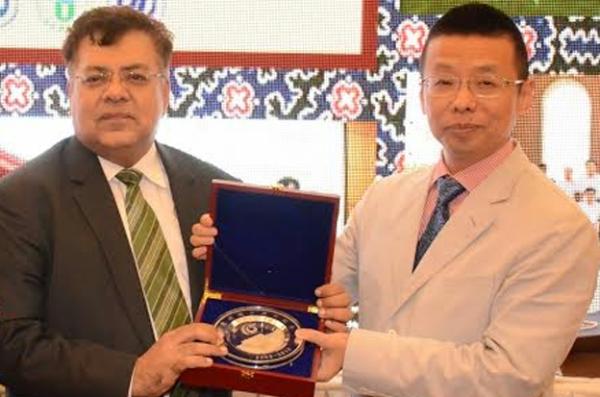KARACHI: Chairman Senate, Mian Raza Rabbani, on Monday said collaboration between the universities of Sindh and Chinese province of Hainan was a 'healthy departure' by Pakistan from the old policy of looking towards educational institutions in Europe and United States, and that 'education corridor' would play a role in forging unity among the nations in Asia. He said there should be a link between the universities of Pakistan and the country's parliament as being practiced elsewhere in the world, which would help the parliamentarians to devise concrete and reality-based policies in light of the guidance and advice of the scholars in universities. The Senate chairman was speaking as the chief guest at the opening session of the Sindh-Hainan Universities Forum under China-Pakistan Partnership organized by the Sindh Madressatul Islam University (SMIU) at Hotel Marriott. With the advent of the three-day Forum, affiliation of the SMIU with four universities in Hainan was formally announced. According to the agreement, the universities would offer admission to the two countries, and SMIU initially will its 20 students to China for short period. Mr Rabbani spoke over the historic background of the Sino-Pakistan relationship. He said former Prime Minister Zulfikar Ali Bhutto and Chairman Mao forged friendship, which strengthened with the passage of time. "We, the people of Asia, share many things in common in our rich history and tremendous future, and initiatives like this will help us a long way to forge inseparable Asian unity," said Mr Raza Rabbani. He said Sindh and Hainan had many things in common - from geography and historic events to the fact that both - communism in the Chinese province and Sufism of Sindh fight against autocracy. "This education corridor launched by the two provinces of the sisterly nations will bring prosperity for both the countries and create economic fortunes that will benefit the generations to come," he said. He said China-Pakistan Economic Corridor (CPEC) would cement relationship between the two countries and improve Pakistan's ability to defend its soil more efficiently. He called on for 'academic freedom' and reinforcement of intellectual discourse in the country as, according to him, it would offer better prospects and shining future and help the parliament come about with reality-based solutions to all sorts of challenges Pakistan faced. "The government should encourage academic discourse in universities and parliament should benefit from the intellect of scholars in universities in its proceedings and future legislation," he said. He said dominant bourgeois stopped debate in universities to perpetuate their rule, which should be restored now. He said Senate had signed memorandums of understanding (MoU) with eight leading universities of Pakistan, under which they would sent interns to the upper house. In fact, he added, some of those interns were already working in the senate. Similarly, Mr Rabbani said, a MoU had been signed with the Institute of Business Administration (IBA) in Karachi, under which they would provide the senate intellectual pool to help members and standing committee devising concrete and reality-based opinions. He said it was high time to ensure autonomy of universities as they were the only forums that could help exposing best talent in Pakistan to the world and make the country one of the leading academic nations in the world. He lauded Vice Chancellor, SMIU, Dr Mohammad Ali Shaikh, for looking to Asia instead of the West as most generally did. Earlier, Dr Mohammad Ali Shaikh traced back the civilizational past of Pakistan and China, which was as ancient as 5,000 years. He said both the countries had trade relations for millennia. He said universities were leading the world and effectively engines that offered advancements to the world. He said formal contact between universities of the two countries materialized last year when a Chinese delegation visited Sindh and was reciprocated by a Pakistani delegation headed by him to China. He said vice chancellors of 13 universities of Sindh were taking part in the conference, which would provide opportunity to them to have direct contact with 10 Chinese delegates from four universities of Hainan and strengthen the relationship further. Acting consul general of the Chinese Mission in Karachi, Mu Yong Ceng, hoped that this forum would open up new avenues in the field of education. Prof Lu Dan, president of Sanya University, said cooperation between the two provinces in the field of education was the only way to gain prosperity for which he gave example of China's development that it achieved in one-third time compared to other nations. Justice (retired) Syed Deedar Hussain Shah and MNA Ghous Bux Maher, members of SMIU syndicate, also spoke on the occasion. Reprinted from: 3-Day “Sindh-Hainan Universities Forum” started

版权地址:海南省三亚市迎宾大道学院路191号 邮编:572022 信息管理:国际合作与交流处 国际处邮箱:guojichu@sanyau.edu.cn 国际处联系电话:0898-88386171
